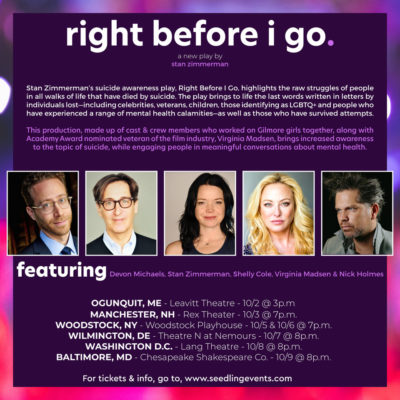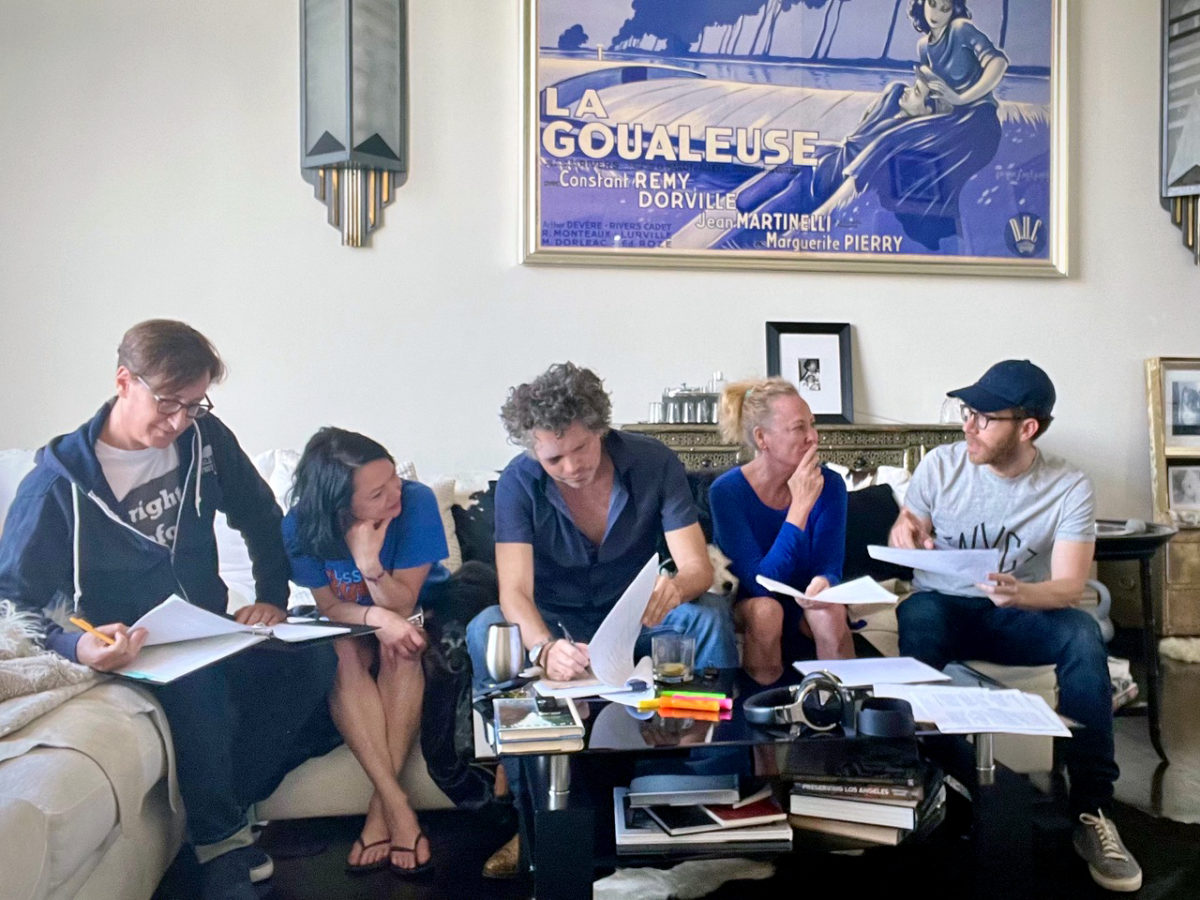Above: The cast of Right Before I Go in rehearsal (l-r): Author/narrator Stan Zimmerman, Shelly Cole, Nick Holmes, Virginia Madsen, and director Devon Michaels.
At Theatre N, a stellar cast will seek to raise awareness of mental health issues by voicing letters from people who took their own lives
By Bob Yearick
On Friday, Oct. 7, Theatre N will host a raw and poignant play that seeks to explain the inexplicable: suicide.
The five-person cast will present the play, Right Before I Go, in reader’s theater style, a first in the 20-year history of Theatre N. In reader’s style theater, actors read narrative material without costumes, props, or scenery. In this case, the actors will give voice to letters written by individuals, including celebrities, who took their own lives or survived suicide attempts.
The cast includes four veterans of the TV show Gilmore Girls, which ran from 2000 to 2007 and has become a cult classic. The Gilmore alums are playwright and narrator Stan Zimmerman (whose writing credits include Gilmore Girls, The Golden Girls, and Roseanne), Shelly Cole, Nick Holmes, and Devon Michaels, who also directs the play.
Joining them will be Holmes’ wife, Virginia Madsen, a Hollywood veteran of many movies and TV shows and an Academy Award nominee in 2005 for Sideways.
The touring company also arranges for participation by the community at each venue. Kathy Buterbaugh, production manager of and long-time volunteer with the Wilmington Drama League, will introduce the play, and Ella Spice, a mental health counselor from Bel Air, Md., will join the after-show talkback with the cast and audience.
Since its acclaimed first performance at the Hollywood Fringe Festival in 2015, the play has traveled across the country, raising awareness of and offering hope for suicide prevention. The Wilmington production will occur in the middle of a whirlwind, one-week tour of six East Coast theaters, starting Oct. 2 in Ogunquit, Maine, and ending Oct. 9 in Baltimore.

Proceeds from the tour will be given to a local nonprofit that supports suicide awareness and prevention within each community. NAMI of Delaware will be the beneficiary of the Oct. 7 show.
Zimmerman wrote Right Before I Go following the suicide of his good friend, Kevin Gill. “I was at a loss about how to process this,” he explained. “Seeing so much shame around the topic, I decided to create a play in the vein of The Vagina Monologues, easily produced with actors on stools, reading the script from music stands. My hope is that this will create an opening for a much needed discussion about the subject.”
Everyone in the cast has been touched in some way by suicide. Madsen, for instance, had a nephew who took his own life last year.
But, says Michaels, “The play itself is nowhere near as daunting as it sounds. Stan characteristically includes gentle humor to help plumb the depths. And our goal is not to embody those who’ve suffered but to honor their uniquely raw poetry, to build empathy and make better advocates of us all.”
The play is a production of Seedling Events, an Austin, Texas, a company owned by Jennie and Marcus Whitaker. Seedling also organizes The Fan Fest Society, held annually on the East Coast since 2016. Through the fan fest, Jennie Whitaker says, Seedling got the idea of recruiting Gilmore cast members for an East Coast tour of Right Before I Go.
Michaels, who played Bill during the last two Gilmore seasons, was brought on board to both act and direct. He spoke to O&A by phone in late September from his home in Los Angeles.
Out & About: What is your personal connection to the issue of mental health?
Devon Michaels: I have a close connection to the mental health community and suicide awareness because of my girlfriend, Kelly O’Malley, who runs a nonprofit here in L.A. called A Light in Dark Places that uses the performing arts to help with suicide prevention. I’ve been pitching in with her show and her nonprofit for the past six years.
O&A: Your first performance is set for Oct. 2, so you obviously have been rehearsing. Is the cast coming together?
DM: It’s turned into sort of a family affair. We have a great time connecting. I can’t say enough about this cast in terms of not just their talent, but that dedication level of caring so deeply about both elements of this, because this really is a dual endeavor. It’s both about making sure we put on a good play, but also it’s about the awareness and the conversation we’re trying to encourage and be a part of. We are all wired to change through stories, and that’s part of why Kelly does what she does, and why we’re doing this. It’s too clinical to just go before a crowd and say, “Let’s talk about depression.”
O&A: Virginia Madsen is the only cast member who was not part of Gilmore Girls, correct?
DM: Yes, but she wanted to be a part of this. She brings this incredible career in film and television, but she also has had the recent loss in her family from suicide, so she’s seen how people don’t know what to say when suicide happens. She’s seen that our culture doesn’t know how to handle this.
That’s why in each location we have mental health professionals with us after the show to engage the audience in a talkback and connect to a conversation that we hope continues long after the show is over.
O&A: So during the show, you read actual letters by people who have died by suicide?
DM: Yes. The framing device is Stan’s story. Stan lost a friend to suicide a few years ago and it affected him in a profound way, and he decided to tell the story of what that was like hearing about it, and his reaction, not knowing what to do. He went into this spiral, and he did a lot of research into suicide notes and went down this rabbit hole of letters written by people who are very famous and people who are mostly anonymous. He decided he would weave them together and tell a story.
There are certain commonalities among the letters, a “brain attack” that occurs in terms of a confluence of variables that are different for everybody. Some of the people were so young, and some were older, and from every walk of life. Some were very successful, or famous, and some were struggling. But all the letters speak with a certain poetry and raw honesty. There’s something about when someone is in that kind of crisis, while terrible, it strips them of artifice of any kind and so they are just truth, truth, truth — even if it’s a misguided truth.
O&A: There is a little humor in the play though?
DM: Yes. Humor is one of the best ways for us to key into things like this and form that pathway to understand it a bit. It’s one huge aspect of what it means to be human and alive.
O&A: Is there anything we can glean from the letters that indicate the causes of these suicides?
DM: Ultimately, the reasons are as varied and complex as human beings are as a whole. The common thread that does seem to emerge is disconnect. For whatever reason — mental illness, depression, or something else — something causes a disconnect from those around us. And that’s why connection in all forms is the antidote to suicide. In the end, though, we can reduce the frequency of suicide by talking about these things more, but we can’t prevent every suicide. That will never happen. We have to accept that, but we can also keep fighting, with every tool we have, whether it be plays or concerts, or just gatherings, or learning more about how to connect one-on-one, or connect more with ourselves, which we all forget to do sometimes.
O&A: Can you cite a couple of contributors to that disconnectedness?
DM: There are so many dynamics in modern society that make us more disconnected. With the technology and the different ways that young people in particular relate to each other, there are people in their teens and 20s who have never really had a phone conversation. It’s only text or social media comments or responses. They barely have that core human experience of being present for each other.
And I think we’re just beginning to glimpse much less comprehend the profound impact our recent political divide has had on the population’s collective mental health. Seeing millions around us lose sight of reality or even the concept of objective truth itself — resorting to mental gymnastics and conspiracy theories to avoid difficult introspection and change — is fundamentally debilitating. Watching friends and family members double down on misguided views we never thought possible makes many of our daily endeavors feel less purposeful. And purpose and meaning are the opposite of depression. The more empathetic we are, the harder we are hit by this new normal. It’s unnatural and exhausting.
O&A: You’re the director of this production, and every director adds his touches to a play. Will this differ from pervious performances?
DM: Jennie and Marcus wanted to add some production values, so it does have some of the bells and whistles of a fully staged production.
For one thing, I’ve brought in a composer friend of mine, Michael Teoli, to put together original music. I thought that would be really important to help drive the play. The music takes it to this other place. We’ll be underscoring most of the notes, which is kind of a creative risk on my part. Sometimes the music is there to kind of commiserate with the reader, and other times it’s there to argue with the reader.

— Right Before I Go will be presented at 8 p.m. on Friday, Oct. 7, at Theatre N, 1007 N. Orange St., Wilmington (Nemours Building). For tickets, go to theatren.com/movie/right-before-i-go. Tickets are $40 for general admission and $60 for VIP, which includes a chat with the cast following the play. For questions, call 302-600-1923.





